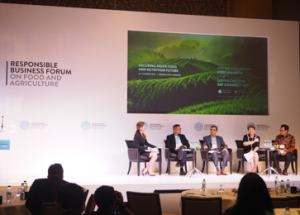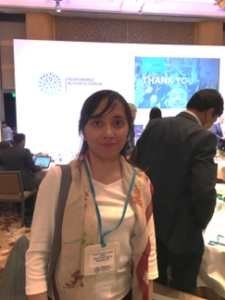Hi all
This is Vicka.
On food issue is everybody responsibility therefore in this workshop, all stakeholders (farmers, international organizations, company, NGO, Forestry and Fisheries) on March 14 th and 15 th , 2017, I had opportunity to attend a workshop “Responsible Business Forum on Food and Agriculture” And workshop included panel session, working group discussion, and networking activities.
Day 1
On the first day, we participated in discussion panel which is about enhancing food security in ASEAN, new approaches to boost health and nutrition in ASIA, the role of business in transforming global food systems, scaling up gender empowerment initiatives in food and agriculture, and Continued with working groups discussion to make some policies recommendation for several top commodities such as aquaculture and fisheries, cacao, palm oil, coffee, dairy, grains, and rice.
 Figure 1. SDG discussion panel by Ms. Francine Pickup, Deputy Country Coordinator, UNDP Indonesia
Figure 1. SDG discussion panel by Ms. Francine Pickup, Deputy Country Coordinator, UNDP Indonesia
According to the discussion, one of the challenges in the development of agriculture is low participation of the young in this sector. Some initiatives and actions In addition, Farmers well-being and innovation and technology diffusion in agricultural (farmer “to” entrepreneur “in order to attract the young in food and agriculture industry. On the other emerging the small-holders by teach them a good agriculture practice, innovation in agriculture supply chain can help farmer to directly link to market, and real-time information for the agriculture. On the other Hand,Therefore, the role of the women in food and agriculture in the small-holder farmers in remote area. The participation and capacity group. The participation and capacity of the women in agricultural sector can be manage by developing women cooperatives so that their skill will be developed and help the livelihood of their family.Community, until society group. The participation and capacity of the women in agricultural sector can be manage by developing women cooperatives so that their skill will be developed and help the livelihood of their family. Community, until society group. The participation and capacity of the women in agricultural sector can be manage by developing women cooperatives so that their skill will be developed and help the livelihood of their family.
All participants joined with a working group topic. All participants joined with a working group, first round discussions focuses on “Finance & Technology”, second on “Knowledge and Markets”. By the farmers in each commodity before making the recommendations which focused on the topic mentioned before.
For instance, in the dairy sector the milk farmer face some problems and challenges such as low productivity, lack of the knowledge of good agricultural practice, the accessibility of good quality of cows and technology (ex: milking machine). Then, all the participant who took this issue were discussed together to produce a win-win recommendations.
Day 2
Reaching the SDG targets simply will not be attained without a strong and sustainable food and agricultural sector. Therefore on the second day of the workshop, focused on the introducing SDG`s framework to the audience and brought it as a theme of the panel discussion such as Multi-stakeholder and integrated approaches to the Sustainable Development Goals “Nutrition and Health” and “Enabling inclusive agribusiness”. The issue of the nutrition come up because now in some countries in Asia region experienced 30% increase to the number of obesity, and children under 5 in Asia 10 million are obese and more than 25 million are stunted.
In my opinion, concerning in the food and agricultural sector can not only solely solved hunger (SDG no.2) but also other challenges including malnutrition, water and energy use, climate change, and unsustainable production and consumption. We simply can say that more than just its direct impact on hunger, ouf food system is also linked to other development challenges that being addressed in the SDGs. Therefore, all the stakeholder should collaborate and has same framework to overcome those issues, by mobilizing scientific, technological, new business model together.
In the day two also, each working groups representative delivered each recommendation of commodities and all participants has to vote which of the recommendations is the most critical & significant. These are significant and critical of recommendations of the 7 commodities in the working group discussion.
- Aquaculture and Fisheries : Integrated farmers into value chain through financial access
- Cocoa : Improve transparency and enhance industry knowledge exchange
- Coffee : Leverage consumer demand to improve sustainable production
- Dairy : Improve smallholder competitiveness by investment in ICT and Technology
- Rice : Promote climate change and resource scarcity adaptation
- Grains : R&D focus on agronomy, nutrition, and post-harvest processing
- Palm oil : Government must support land titling process for smallholders
 figure 2. My picture after the closing ceremony
figure 2. My picture after the closing ceremony
In overall, this workshop gave me some insight and new opportunity to talk with the people from food industry and government to talk together and create a “win win win”solution for all stakeholders and especially for realizing the well-being of the smallholders that sometime neglected by the people. As the role of the academician, we can contribute to seek the solution by using scientific approach and make a collaboration with any other stakeholder the problem can be directly implemented in the society. In addition, the change of the business model in the agriculture sector that can sustain and viable economically by increase capacity building of the farmer, youth and women involvement. I wish this kind of workshop can make the link between industry and academia can be further enhanced with full support from the government